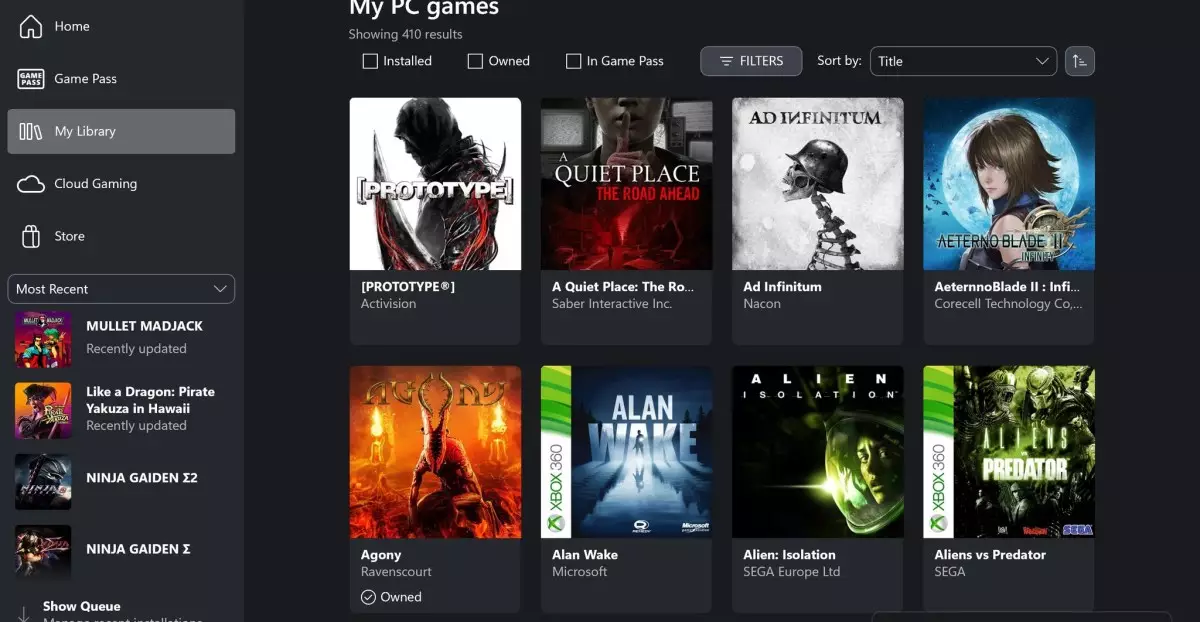In the rapidly evolving world of gaming, Microsoft is steering towards a thrilling new chapter by merging its Xbox console and Windows landscapes. Recent developments in the Xbox app on Windows signal the dawn of a true unified gaming experience that has long been anticipated by gamers and tech enthusiasts alike. Tom Warren, an esteemed technology journalist with over two decades of insider knowledge, has brought our attention to crucial changes unfolding within the Microsoft ecosystem.
For years, players have navigated through distinct platforms, each boasting exclusive titles and ecosystems. However, Microsoft’s recent initiative reflects a compelling strategy aimed at dismantling these barriers. With an intriguing twist, the Xbox PC app is now displaying console titles—like the classic Alan Wake—within its library, even if they remain unplayable on PC. This is indicative of a shift towards a more encompassing gaming library strategy that seems too deliberate to be mere coincidence.
A Strategic Vision Behind the Scenes
What lies behind these early indicator signs? This development suggests a meticulous plan orchestrated by Microsoft to underpin a more integrated gaming environment. With past reports hinting at collaborations, such as Project Kennan involving gaming handhelds, Microsoft seems to be blending its console prowess with its PC strengths, emphasizing an all-encompassing gaming repository. The aim? Creating a universal gaming library that resides within the Xbox PC app.
This move goes beyond merely consolidating libraries; it’s about elevating the experience for gamers. By enabling users to see their installed titles across various platforms—regardless of whether they originated from the Microsoft Store, Steam, or the Epic Games Store—Microsoft displays an intent to cultivate a vibrant ecosystem where gamers can access their entire collection seamlessly.
The Branding Shift: Xbox PC and Beyond
Accompanying the functional changes is a rebranding effort, with Microsoft starting to drop “app” in favor of “Xbox PC.” This subtle shift in naming not only signifies an upgrade but also aligns with the contemporary ethos of gaming platforms, which are increasingly perceived as holistic experiences rather than mere applications. The introduction of this branding alongside new titles further strengthens the perception of Xbox PC as the premier destination for gamers on Windows.
Evidence of this new branding strategy is manifested in promotional materials, including trailers for anticipated games like Gears of War: Reloaded. Such initiatives connect Xbox’s historical legacy with the modern gaming framework that Microsoft aspires to promote. By doing so, they effectively create an immersive narrative that resonates with both long-time followers and new players.
Challenges Ahead: Overcoming Technological Barriers
However, as with any ambitious transformation, challenges are inherent in this journey. A prevailing question emerges: will Xbox console games become directly playable on PC? While an expansive library is enticing, the feasibility hinges upon Microsoft’s cloud capabilities and potential emulation advancements. The success of this integration depends not just on creating a cohesive interface but on the actual accessibility of titles across platforms.
With competitors like SteamOS making inroads by offering portable gaming experiences, Microsoft faces pressure to respond robustly. Their recent changes suggest a recognition of the market dynamics but also the urgency of delivering on promises made to consumers. If executed effectively, this could redefine how players experience gaming across devices, fundamentally changing the market landscape.
The Future is Bright and Competitive
As we move forward, the anticipation surrounding Microsoft’s strategy should be palpable. The integration of Xbox and Windows is not just a fascinating experiment; it represents a clear response to the realities of a competitive gaming market. The ability for users to see and interact with a broad spectrum of games from a singular platform has the potential to shift the tides in favor of Microsoft.
The trajectory of Microsoft signifies bold ambition—demonstrating a firm commitment to enhancing user experiences and adapting to the ever-changing gaming ecosystem. Embracing innovation while staying responsive to feedback will be vital as this narrative unfolds. Gamers around the world are keenly watching, and the stakes couldn’t be higher.

